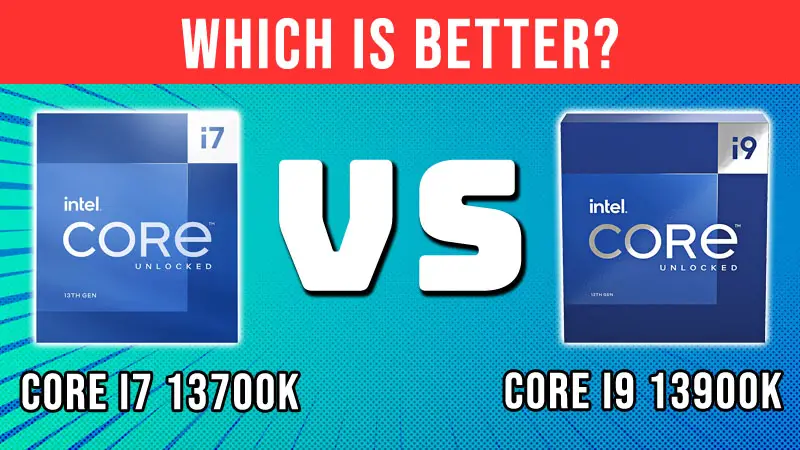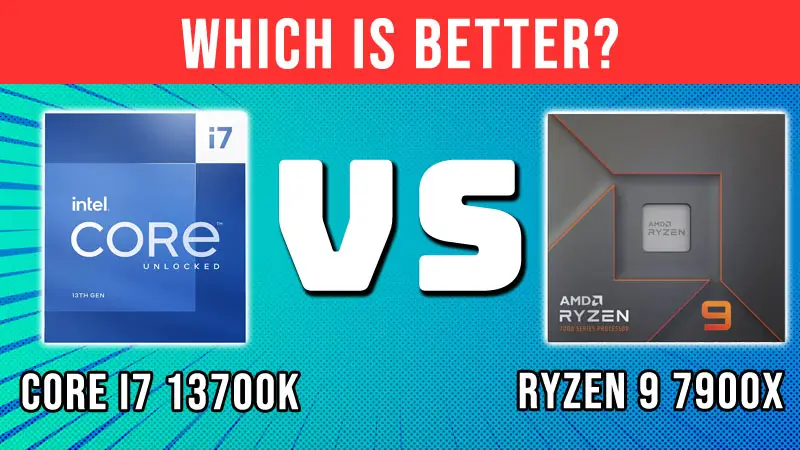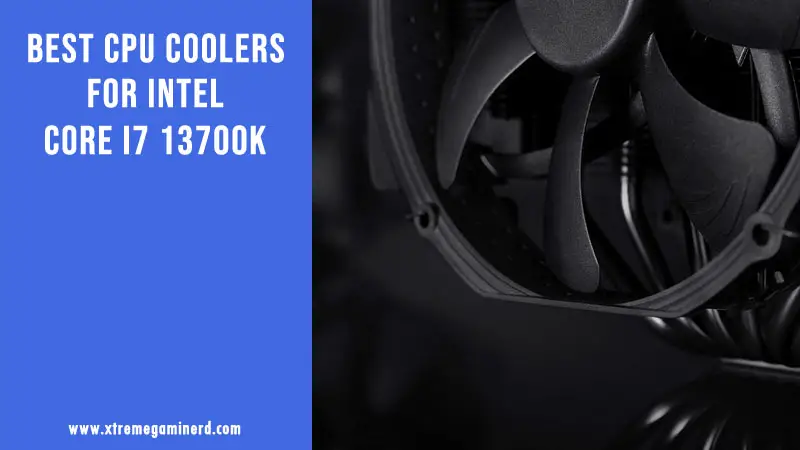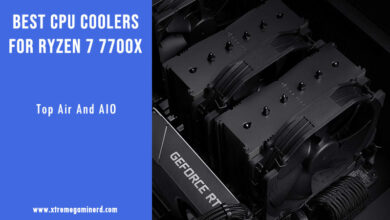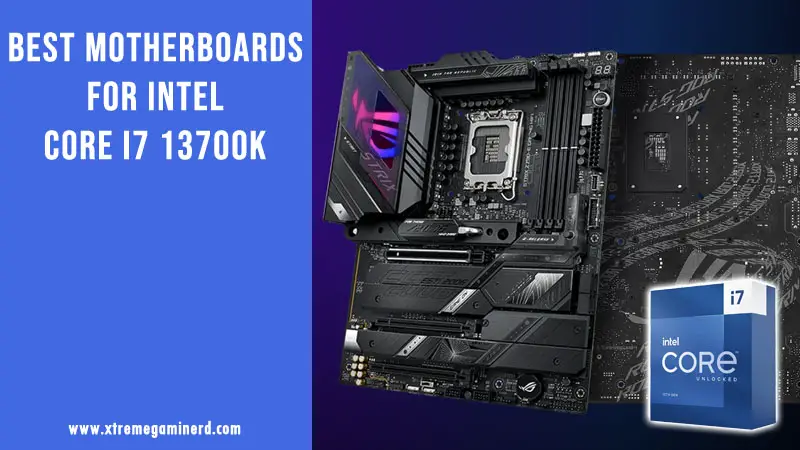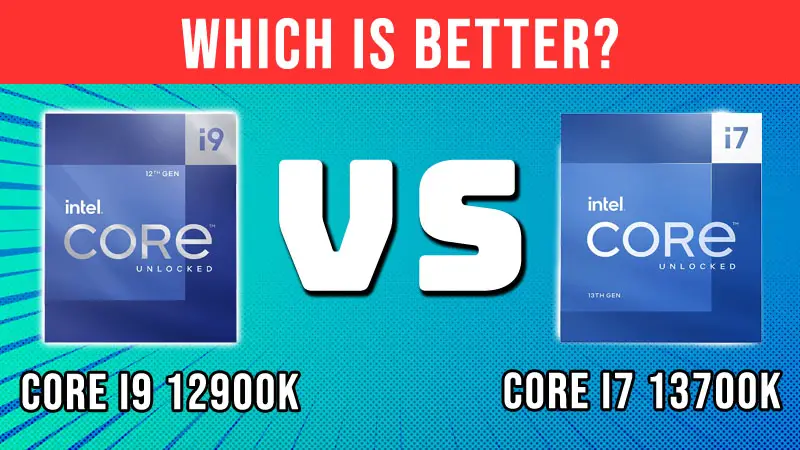Every year the CPU competition goes fierce and it has been really aggressive this year with the back to back launches of new processors from AMD and Intel.
Intel Alder Lake already posed a threat to AMD but Ryzen 7000 did a good job of showing that AMD is not behind either. However, with the Raptor Lake series launch, the crown seems to go into the hands of Intel.
In this post, we are going to take a look at the comparison between the high-end CPUs from both parties i.e., the Core i7 13700K and Ryzen 7 7700X. We will compare them in Specs, Architecture, Compatibility, Gaming/Application performance, Thermals, Power efficiency, and of course, the Value for the money.
Specifications Difference
SPECS | INTEL CORE i7 13700K | AMD RYZEN 7 7700X |
Code Name | Raptor Lake | Raphael |
Lithography | Enhanced Intel 7(10nm) | 5nm |
Socket | LGA 1700 | AM5 |
Cores/Threads | 16/24 | 8/16 |
Clock Speeds | 2.5-4.2GHz/3.4-5.3GHz | 4.5/5.4GHz |
L2/L3 Cache | 24/30MB | 8/32MB |
TDP | 125-253W | 105W |
Integrated Graphics | Yes | Yes |
As obvious from the above table, the biggest difference between the two is the core/thread count. Intel has increased the core/thread count dramatically over the past few generations giving the 13700K the most amount of cores. AMD, on the other hand, retained the same 8 cores and 16 threads on the Ryzen 7 7700X.
There is still some difference in what types of cores the Ryzen and Core i7 feature. The Core i7 7700X features 8 Performance and 8 Efficient cores which equals 16 and as the Efficient cores don’t feature any hyperthreading, the total threads are 24.
Ryzen 7700X features a significantly higher base clock speed while the 13700K features different clock speeds of Performance and Efficient cores. As the Performance cores take the most stress, they are clocked higher than the Efficient cores which handle the background tasks.
L2 cache memory also has a big difference with 13700K bringing 3X times more L2 cache than 7700X. However, there is only a 2MB difference in L3 cache memory. Lastly, one more big difference is the total power draw which is almost 2.5X more on the 13700K.
- 13th Gen Intel Core processors offer revolutionary...
- 16 cores (8 P-cores + 8 E-cores) and 24 threads
- Up to 5.4 GHz unlocked. 30M Cache
- Integrated Intel UHD Graphics 770 included
Architectural Difference
The architectures of both CPUs can’t be compared directly and there is not much benefit in comparing how they work. Still, we will take a look at how they are designed and what benefits each of them bring over the past generation.
The Ryzen 7700X uses the latest Zen 4 architecture and brings a single chiplet design that uses a 5nm process node. This helps it to pack more transistors than the previous Zen 3 based CPUs and helps it make power efficient. The die design is not that different from Zen 3 except that AMD dropped the CCX(Core CompleX) concept and now we have 8 cores on a single CCD.
The i7 13700K, on the other hand, uses the enhanced Intel 7 which is a 10nm process node and features a hybrid architecture. It uses 8 Raptor Cove Performance cores and 8 Gracemont Efficient cores. Both Raptor Lake and Zen 4 are a kinda refresh of the Alder Lake and Zen 3 architectures respectively with some improvements here and there to improve the single and multi-core performance.
Motherboard Compatibility
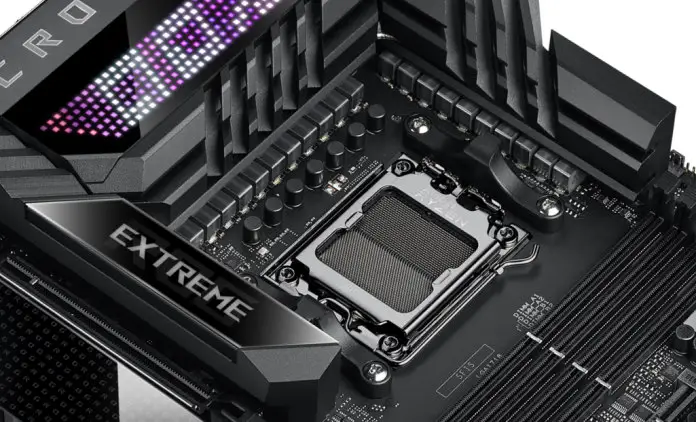
Ryzen 7700X is compatible with an AM5 socket while the 13700K is compatible with LGA 1700 socket. Both are totally different platforms and as usual, you cannot use these processors on the other socket.
AMD finally stopped the AM4 socket for the 7000 series and with that, the PGA(Pin Grid Socket) also died. The AM5 socket is now LGA(Land Grid Array) similar to the Intel sockets featuring pins on the socket and not on the processor.
LGA 1700 is one year older than AM5 but has a lot more compatible chipsets than AM5. AM5 has only four chipsets: X670, X670E, B650, and B650E where the “E” stands for Extreme for more PCI-E 5.0 lanes. LGA 1700, on the other hand, features several 600 and 700 chipsets.
Now one important thing to understand is that as both CPUs are overclockable, you will only be able to overclock them using an unlocked chipset. Fortunately, all four AM5 chipsets allow overclocking, however only the Z690 and Z790 chipsets on LGA 1700 allow overclocking.
RAM Compatibility
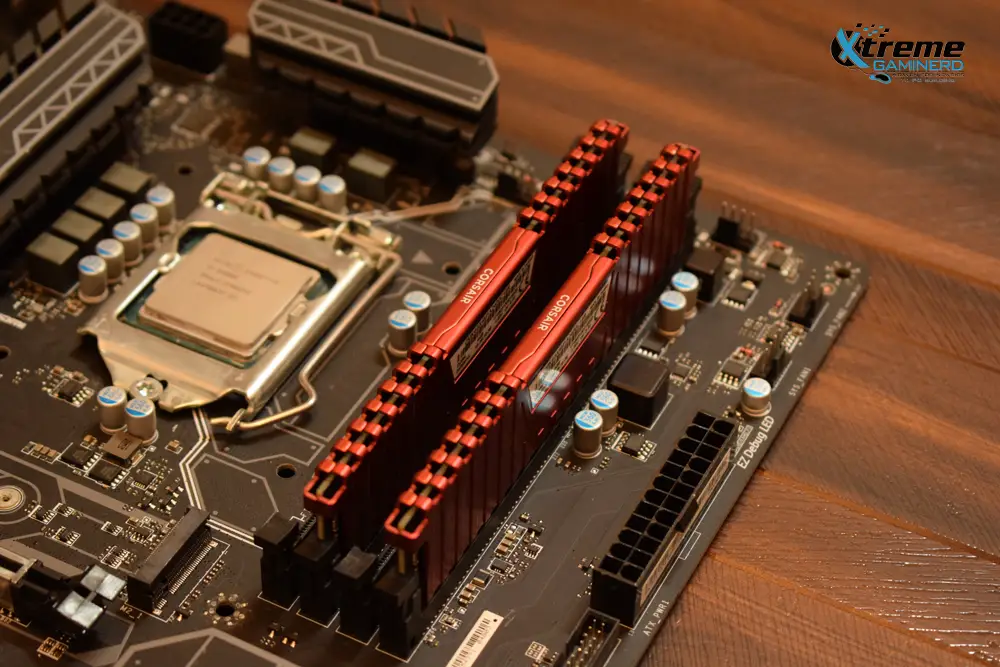
The Ryzen 7700X can only support DDR5 memory out of the box and there is no way you can let it work with DDR4 memories. Intel i7 13700K, on the other hand, supports both DDR4 and DDR5 memories.
Even though Intel was planning to ditch DDR4 RAM support for Raptor Lake CPUs, it canceled its plan and gave a hard strike to AMD by giving DDR4 support to Raptor Lake CPUs. DDR5 RAM is, however, faster than DDR4 and the i7 13700K has a 400MHz higher memory frequency support than 7700X natively.
Gaming And Application Performance

To make a fair comparison between the two, we also need real-world benchmark numbers to come to a conclusion. After comparing their numbers in gaming and applications, we can take all the factors together to see which processor provides the best value.
To analyze the results, we will take 3-4 sources because every source is prone to errors and inaccuracies, and having more than one source will give us more consistent and reliable results. We are considering Gamers Nexus((https://www.youtube.com/watch?v=-KbNz8966-I)), Tomshardware((https://www.tomshardware.com/reviews/intel-core-i7-13700k-cpu-review)), Techspot((https://www.techspot.com/review/2554-intel-core-i7-13700k/)), and Techpowerup((https://www.techpowerup.com/review/intel-core-i7-13700k/)) which are widely considered reliable when it comes to PC hardware reviews.
In gaming tests, the difference isn’t too large to declare the i7 13700K a clear winner. Yes, the 13700K does perform better than the 7700X but the difference is around 4-6% at max . It should also be noted that the higher the resolution, the lesser the performance gap becomes.
In CPU-dependent apps, the i7 13700K proves to be too much for the 7700X in some while in some, the gap isn’t big enough. For instance, the i7 13700K is around 43% faster in Blender rendering, 51% faster in Multi-core rendering in Cinebench R23, 31% faster in Compression, 16% faster in Decompression, and 35% faster in media encoding.
On the other hand, the i7 13700K is barely 5% faster than 7700X in single-core tests and is almost a tie in Premiere pro with some sources favoring the 13700K over the 7700X and vice-versa . This is the same story for Adobe Photoshop and therefore, we can clearly conclude that there is not much difference in their single-core performance but the multi-core performance of 13700K is on the next level due to more cores and threads.
- This dominant gaming processor can deliver fast...
- 8 Cores and 16 processing threads, based on AMD...
- 5.4 GHz Max Boost, unlocked for overclocking, 80...
- For the state-of-the-art Socket AM5 platform, can...
Thermals And Power Consumption
Now let’s take a look at the thermals and see which one runs hotter. One thing to remember is that it is quite difficult to compare two different results as every source uses a different setup, methodology, and environment to test the temperatures. It is only fair if we take a single source as all the factors are similar.
Unfortunately, as most sources don’t include a thermal chart, we are only stuck with Techpowerup’s thermal chart which is of course, very informative and reliable.
Using Blender to stress test with a Noctua NH-U14S CPU cooler, the 13700K runs 8 degrees Celcius hotter than the 7700X. In gaming, however, the temperature does come down the to early 70s with the 7700X still taking a small lead of 2 degrees. It’s unfortunate that these processors have become a heater and don’t perform as well as the previous generations.
In the power consumption test, there is a difference of night and day. The 13700K in some cases consumes up to 90% more power than the 7700X . Almost every source gets an 80-90% power consumption difference between the two. So, we can clearly see how the 13700K achieves those high multi-core performance numbers.
Value For The Price
Even though I mostly consider pricing and performance as a factor to calculate the Value, I believe we need to talk about power consumption as well. For almost the same original MSRP of $400-$420, the 13700K crushes the Ryzen 7700X in productivity while remaining a little ahead in gaming too.
Currently, the price of 7700X has been slashed to $350. So, that’s a 20% lower price on the 7700X for an average of 15-20% slower performance than the 13700K if we consider gaming, single-core, and multi-core numbers.
But here comes an interesting part. When we consider the performance per watt, the 7700X is easily 40-50% better in productivity and beats the 13700K easily. Also, the AM5 socket is to stay here for much longer than the LGA 1700 which is getting replaced by another LGA socket next year.
On the other hand, if a user wants to buy a DDR4 motherboard and DDR4 RAM, the cost of the build will be much lower than using an AM5 platform but of course, that will also reduce the performance of 13700K.
I believe that, if we take all these factors into account, currently, the Ryzen 7700X looks a little better to me for its new price of $350. But if you find it for $400, I would give the 13700K the preference.
Final Words
This was a detailed comparison between the two CPUs and we highly encourage that you keep all the points in mind as explained above to make your choice. Let me know which processor you think wins the overall game.
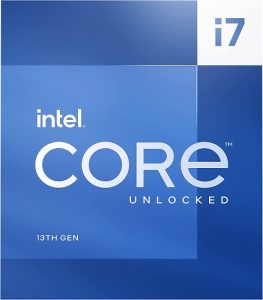
Reasons To Buy Core i7 13700K
[wp-svg-icons icon=”thumbs-up” wrap=”i” color=green] Significantly higher multi-core performance
[wp-svg-icons icon=”thumbs-up” wrap=”i” color=green] Better DDR5 compatibility
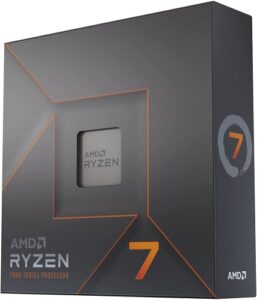
Reasons To Buy Ryzen 7 7700X
[wp-svg-icons icon=”thumbs-up” wrap=”i” color=green] AM5 will last longer
[wp-svg-icons icon=”thumbs-up” wrap=”i” color=green] Much more power-efficient
Related:
- AMD Ryzen 7 7700X vs Ryzen 9 7900X
- AMD Ryzen 7 7700X vs Core i7 12700K
- AMD Ryzen 7 7700X vs Ryzen 7 5800X3D
- AMD Ryzen 7 7700X vs Ryzen 7 5700X
- AMD Ryzen 7 7700X vs Ryzen 5 7600X
- AMD Ryzen 7 7700X vs Core i5 13600K
- Intel Core i7 13700K vs Core i9 12900K
- Intel Core i7 13700K vs Core i9 13900K
- Intel Core i7 13700K vs Core i7 12700K
- Intel Core i7 13700K vs Ryzen 9 7900X
